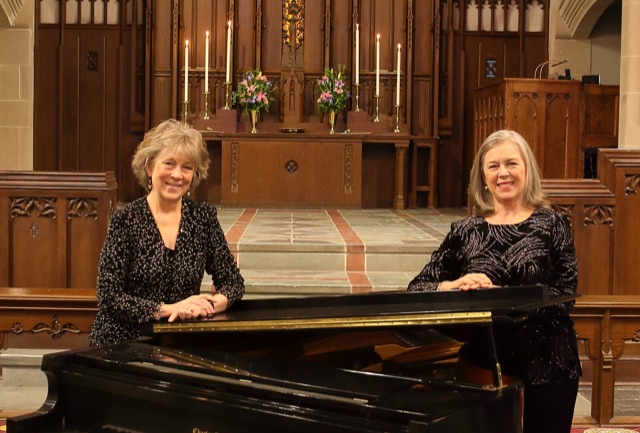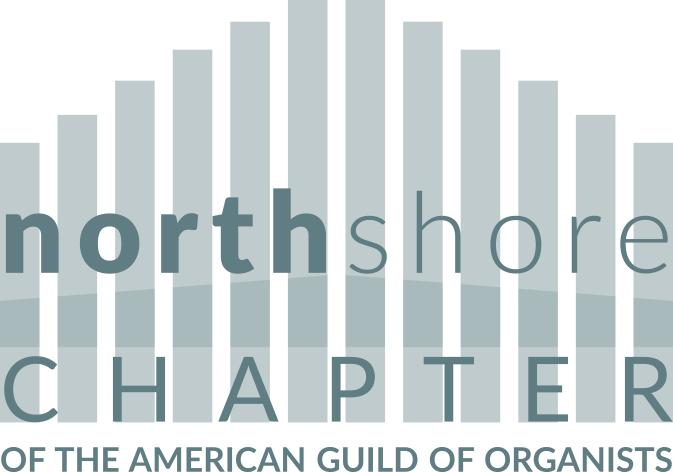
Andrea Handley and Sharon Peterson discovered their mutual enthusiasm for playing two-piano repertoire together through a friendship that blossomed in our chapter. They are preparing to play a two-piano concert on Sunday, April 3 at 4:00 p.m. at Trinity United Methodist Church in Wilmette. The concert will be offered both in-person and as a livestream.
In anticipation of their performance, Sub-Dean Richard Clemmitt asked them a few questions:
R: How did the two of you meet?
A: I first remember meeting Sharon at an AGO event, but I had heard of her before that, as pianist for the North Shore Choral Society. Julia Davids, who directs the NSCS, is the choir director at Trinity UMC in Wilmette, where I am organist. Julia often commented about how similar we were as pianists, and I remember her telling me at some point, ‘You should meet Sharon Peterson – you two would get along well.’
S: We actually got better acquainted when I served as Sub-Dean while Andrea was Dean of the NorthShore AGO Chapter. I also subbed for her at Trinity United Methodist and understood her musicality and attention to detail in the notes she’d leave for me as her substitute.
R: When did you start playing together?
A: The first time we played together was ‘Sleigh Ride’, for 4 hands, at my home for the 2018 AGO Epiphany party. I remember thinking at the time how similar we were stylistically. I could tell by her playing that she had been primarily a pianist before becoming an organist, as I had. Then in 2020, we prepared a virtual video on two pianos for the Epiphany party (https://www.youtube.com/watch?v=3uf-5gny36s). We enjoyed that so much we decided to prepare several other virtual videos throughout spring of 2021. Once people began to actually perform together again as restrictions loosened, we decided it would be fun to do a two-piano concert together, and the rest is history.
S: I’ll always be grateful Andrea took on the editing of our virtual performances. I didn’t have the time or patience to learn that skill! We received nice comments from both our churches, (and Facebook friends,) so it was a rewarding experience.
R: What is your background with regard to piano and organ?
A: I have a Bachelor’s degree in piano from Indiana University School of Music. While I played organ in churches from the time I was in junior high school on, and studied it briefly while at IU as an undergrad, piano was my main instrument until I decided a few years out of college to pursue a Master’s degree in organ – which I did from the American Conservatory.
S: I earned my BM degree at North Park College, (now University,) but I’d begun organ lessons in 6th grade. Eventually I had to give up lessons in High School – but continued as Organist for a Lutheran church in Jamestown, NY, until coming to Chicago for college. While at Northwestern University, I studied organ – in addition to getting a MM in Piano/Accompanying there. As my choral accompanying developed, I saw more opportunities to transfer orchestral registrations to the organ. My work on each instrument enhances the other.
R: What do you like about two-piano performing?
A: It’s so much fun!! We’ve both agreed that we’re having more fun with this concert prep than we’ve had musically in years. The collaboration is so much fun, and so different than the hours spent in solo practice as an organist. And it’s certainly the most challenging piano music I’ve played since my senior recital! There’s a sense of sort of rediscovering my ‘first love’ as a musician. And it’s made even more fun by the fact that the more Sharon and I work together, the more we discover our musical similarities. We think alike, we interpret similarly, we just play similarly.
S: It’s chamber music! I love being a collaborative pianist with singers and instrumentalists, so this is an extension of that ensemble. Another positive is that we push each other. We discuss how to solve technical problems and interpretation. However, sometimes our interpretations come together without any discussion.
R: How does it compare with organ performing?
A: How do you compare two loves?!? I love playing the organ – I love the endless color possibilities, the complexities of the instrument, the challenge of coordinating all four limbs. But it’s very different than piano playing. The piano is so much more immediate, intimate. It’s much more physical – fortissimo is achieved by sheer physical strength coming from the whole body, rather than by opening a box with your foot or pulling more stops. And the sound comes out just inches from you instead of feet or yards away. And then add the collaborative nature of two-piano playing, and it makes for a very different experience.
S: When I play piano I listen for inherent voicings and colors. My favorite aspect about the piano is that the touch is so sensitive and that the tone can be so beautifully enhanced by the pedal. I try to play just as musically on the organ, using registration and room acoustics to enhance musicality. I find that careful listening helps me transfer each instrument’s strongest features to the other. For example, I frequently bring out the left hand in the piano – inspired by the organ’s pedal.
